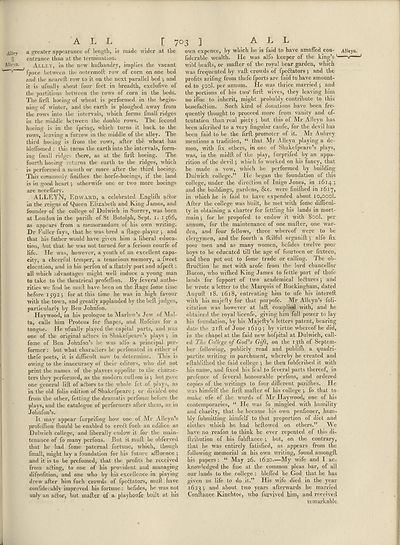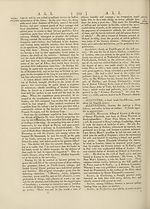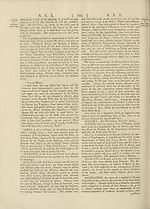Encyclopaedia Britannica, or, a Dictionary of arts, sciences, and miscellaneous literature : enlarged and improved. Illustrated with nearly six hundred engravings > Volume 1, A-AME
(749) Page 703
Download files
Complete book:
Individual page:
Thumbnail gallery: Grid view | List view

ALL [ 703 ] ALL
Alley a greater appearance of length, is made wider at the
|j entrance than at the termination.
Alleyn. Alley, in the new hufbandry, implies the vacant
' k fpace between the outermoft row of corn on one bed
and the neareft row to it on the next pai-allel bed •, and
it is ufually about four feet in breadth, exclufive of
the partitions between the rows of corn in the beds.
The lirfl hoeing of wheat is performed in the begin¬
ning of winter, and the earth is ploughed away from
the rows into the intervals, which forms fmall ridges
in the middle between the double rows. The fecond
hoeing is in the fpring, which turns it back to the
rows, leaving a furrow in the middle of the alley. The
third hoeing is from the rows, after the wheat has
bloffomed : this turns the earth into the intervals, form¬
ing fmall ridges there, as at the firil hoeing. The
fourth hoeing returns the earth to the ridges, which
is performed a month or more after the third hoeing.
This commonly finifhes the horfe-hoeings, if the land
is in good heart •, otherwife one or two more hoeings
are neceffary.
ALLEYN, Edward, a celebrated Englifli aftor
in the reigns of Queen Elizabeth and King James, and
founder of the college of Dulwich in Surrey, was born
at London in the parifh of St Botolph, Sept. 1. 1566,
as appears from a memorandum of his own writing.
Dr Fuller fays, that he was bred a ftage-player *, and
that his father would have given him a liberal educa¬
tion, but that he was not turned for a ferious courfe of
life. He was, however, a youth of an excellent capa¬
city, a cheerful temper, a tenacious memory, a fweet
elocution, and in his perfon of a llately port and afpedt:
all which advantages might well induce a young man
to take to the theatrical profeffion. By feveral autho¬
rities we find he mu id have been on the ilage lome time
before 1592; for at this time he was in high favour
with the town, and greatly applauded by the bell judges,
particularly by Ben Johnfon.
Haywood, in his prologue to Marlow’s Jew of Mal¬
ta, calls him Proteus for lhapes, and Rofcius for a
tongue. He ufuallv played the capital parts, and was
one of the original actors in Shakefpeare’s plays ; in
fome of Ben Johnfon’s lie was alfo a principal per¬
former : but what characters he perfonated in either ol
thefe poets, it is difficult nowr to determine. This is
owing to the inaccuracy of their editors, who did not
print the names of the players oppolite to the charac¬
ters they performed, as the modern cuftom is •, but gave
one general lill of actors to the whole fet ol plays, as
in the old folio edition of Shakefpeare } or divided one
from the other, fetting the dramatis perfonse before the
plays, and the catalogue of performers after them, as in
Johnfon’s.
It may appear furprifing how one ol Mr Alleyn’s
profeffion Ihould be enabled to eredt fuch an edifice as
Dulwich college, and liberally endow it for the main¬
tenance of fo many perfons. But it mull be obferved
that he had fome paternal fortune, which, though
fmall, might lay a foundation for his future affluence ;
and it is to be prefumed, that the profits he received
from adting, to one of his provident and managing
difpofition, and one who by his excellence in playing
drew after him fuch crowds of fpedtators, mull have
confiderably improved his fortune : befides, he was not
only an adtor, but mailer of a playhoufe built at his
own expence, by which he is laid to have amaffed con- Alleyn.
fiderable wealth. He was alio keeper of the king’s ' r—
wild bealls, or mailer of the royal bear garden, which
was frequented by vail crowds of fpedtators •, and the
profits arifmg from thefe fports are faid to have amount¬
ed to 500I. per annum. He was thrice married ; and
the portions of his two’ firll wives, they leaving him
no ilfue to inherit, might probably contribute to this
benefadtion. Such kind of donations have been fre¬
quently thought to proceed more from vanity and of-
tentation than real piety j but this of Mr Alleyn has
been aferibed to a very lingular caufe, for the devil has
been faid to be the firll promoter of it. Mr A ubrey
mentions a tradition, “ that Mr Alleyn playing a de¬
mon, with fix others, in one of Shakelpeare’s plays,
was, in the midll of the play, furprifed by an appa¬
rition of the devil 5 which fo worked on his fancy, that
he made a vow, which he performed by building
Dulwich college.” He began the foundation of this
college, under the direction ol Inigo Jones, in 1614 j
and the buildings, gardens, &c. were finilhed in 1617,
in which he is faid to have expended about io,oool.
After the college was built, he met with fome difficul¬
ty in obtaining a charter for fettling his lands in mort¬
main $ for he propoled to endow it with 800I. per
annum, for the maintenance of one mailer, one war¬
den, and four fellows, three whereof were to be
clergymen, and the fourth a Ikilful organill j alfo fix
poor men and as many women, befides twelve poor
boys to be educated till the age of fourteen or fixteen,
and then put out to fome trade or calling. The ob-
llruftion he met with arofe from the lord chancellor
Bacon, who wilhed King James to fettle part of thofe
lands for fupport of two academical leftures; and
he wrote a letter to the Marquis of Buckingham, dated
Augull 18. 1618, entreating him to ufe his interell
Avith his majelly for that purpofe. Mr Alleyn’s feli¬
citation Avas hoAvever at lall complied Avith, and he
obtained the royal licenfe, giving him full poAver to lay
his foundation, by his Majelly’s letters patent, bearing
date the 2ill of June 1619 j by virtue whereof he did,
in the chapel at the faid neAV hofpital at Duhvich, call¬
ed T/ic College of God's Gtft, on the 13th of Septem¬
ber following, publicly read and publifh a quadri¬
partite Avriting in parchment, whereby he created and
eftablifhed the faid college j he then fuhfcribed it with
his name, and fixed his feal to feveral parts thereof, in
prefence of feveral honourable perfons, and ordered
copies of the waitings to four different parilhes. He
Avas himfelf the firil mailer of his college *, fo that to
make ufe of the words of Mr HayAvood, one of his
contemporaries, “ He Avas fo mingled Avith humility
and charity, that he became his own penfioner, hum¬
bly fubmitting himfelf to that proportion of diet and
clothes which he had bellowed on others.” We
have no reafon to think he ever repented of this di-
liribution of his fubllance ; but, on the contrary,
that he Avas entirely fatisfied, as appears from the
following memorial in his own Avriting, found amongll
his papers: “ May 26. 1620.—My Avife and I ac-
knoAvledged the fine at the common pleas bar, of all
our lands to the college : bleffed be God that he has
given us life to do it.” His Avife died in the year
1623 ; and about two years afterAvards he married
Conftance Kincbtoe, Avho furvived him, and received
remarkable
Alley a greater appearance of length, is made wider at the
|j entrance than at the termination.
Alleyn. Alley, in the new hufbandry, implies the vacant
' k fpace between the outermoft row of corn on one bed
and the neareft row to it on the next pai-allel bed •, and
it is ufually about four feet in breadth, exclufive of
the partitions between the rows of corn in the beds.
The lirfl hoeing of wheat is performed in the begin¬
ning of winter, and the earth is ploughed away from
the rows into the intervals, which forms fmall ridges
in the middle between the double rows. The fecond
hoeing is in the fpring, which turns it back to the
rows, leaving a furrow in the middle of the alley. The
third hoeing is from the rows, after the wheat has
bloffomed : this turns the earth into the intervals, form¬
ing fmall ridges there, as at the firil hoeing. The
fourth hoeing returns the earth to the ridges, which
is performed a month or more after the third hoeing.
This commonly finifhes the horfe-hoeings, if the land
is in good heart •, otherwife one or two more hoeings
are neceffary.
ALLEYN, Edward, a celebrated Englifli aftor
in the reigns of Queen Elizabeth and King James, and
founder of the college of Dulwich in Surrey, was born
at London in the parifh of St Botolph, Sept. 1. 1566,
as appears from a memorandum of his own writing.
Dr Fuller fays, that he was bred a ftage-player *, and
that his father would have given him a liberal educa¬
tion, but that he was not turned for a ferious courfe of
life. He was, however, a youth of an excellent capa¬
city, a cheerful temper, a tenacious memory, a fweet
elocution, and in his perfon of a llately port and afpedt:
all which advantages might well induce a young man
to take to the theatrical profeffion. By feveral autho¬
rities we find he mu id have been on the ilage lome time
before 1592; for at this time he was in high favour
with the town, and greatly applauded by the bell judges,
particularly by Ben Johnfon.
Haywood, in his prologue to Marlow’s Jew of Mal¬
ta, calls him Proteus for lhapes, and Rofcius for a
tongue. He ufuallv played the capital parts, and was
one of the original actors in Shakefpeare’s plays ; in
fome of Ben Johnfon’s lie was alfo a principal per¬
former : but what characters he perfonated in either ol
thefe poets, it is difficult nowr to determine. This is
owing to the inaccuracy of their editors, who did not
print the names of the players oppolite to the charac¬
ters they performed, as the modern cuftom is •, but gave
one general lill of actors to the whole fet ol plays, as
in the old folio edition of Shakefpeare } or divided one
from the other, fetting the dramatis perfonse before the
plays, and the catalogue of performers after them, as in
Johnfon’s.
It may appear furprifing how one ol Mr Alleyn’s
profeffion Ihould be enabled to eredt fuch an edifice as
Dulwich college, and liberally endow it for the main¬
tenance of fo many perfons. But it mull be obferved
that he had fome paternal fortune, which, though
fmall, might lay a foundation for his future affluence ;
and it is to be prefumed, that the profits he received
from adting, to one of his provident and managing
difpofition, and one who by his excellence in playing
drew after him fuch crowds of fpedtators, mull have
confiderably improved his fortune : befides, he was not
only an adtor, but mailer of a playhoufe built at his
own expence, by which he is laid to have amaffed con- Alleyn.
fiderable wealth. He was alio keeper of the king’s ' r—
wild bealls, or mailer of the royal bear garden, which
was frequented by vail crowds of fpedtators •, and the
profits arifmg from thefe fports are faid to have amount¬
ed to 500I. per annum. He was thrice married ; and
the portions of his two’ firll wives, they leaving him
no ilfue to inherit, might probably contribute to this
benefadtion. Such kind of donations have been fre¬
quently thought to proceed more from vanity and of-
tentation than real piety j but this of Mr Alleyn has
been aferibed to a very lingular caufe, for the devil has
been faid to be the firll promoter of it. Mr A ubrey
mentions a tradition, “ that Mr Alleyn playing a de¬
mon, with fix others, in one of Shakelpeare’s plays,
was, in the midll of the play, furprifed by an appa¬
rition of the devil 5 which fo worked on his fancy, that
he made a vow, which he performed by building
Dulwich college.” He began the foundation of this
college, under the direction ol Inigo Jones, in 1614 j
and the buildings, gardens, &c. were finilhed in 1617,
in which he is faid to have expended about io,oool.
After the college was built, he met with fome difficul¬
ty in obtaining a charter for fettling his lands in mort¬
main $ for he propoled to endow it with 800I. per
annum, for the maintenance of one mailer, one war¬
den, and four fellows, three whereof were to be
clergymen, and the fourth a Ikilful organill j alfo fix
poor men and as many women, befides twelve poor
boys to be educated till the age of fourteen or fixteen,
and then put out to fome trade or calling. The ob-
llruftion he met with arofe from the lord chancellor
Bacon, who wilhed King James to fettle part of thofe
lands for fupport of two academical leftures; and
he wrote a letter to the Marquis of Buckingham, dated
Augull 18. 1618, entreating him to ufe his interell
Avith his majelly for that purpofe. Mr Alleyn’s feli¬
citation Avas hoAvever at lall complied Avith, and he
obtained the royal licenfe, giving him full poAver to lay
his foundation, by his Majelly’s letters patent, bearing
date the 2ill of June 1619 j by virtue whereof he did,
in the chapel at the faid neAV hofpital at Duhvich, call¬
ed T/ic College of God's Gtft, on the 13th of Septem¬
ber following, publicly read and publifh a quadri¬
partite Avriting in parchment, whereby he created and
eftablifhed the faid college j he then fuhfcribed it with
his name, and fixed his feal to feveral parts thereof, in
prefence of feveral honourable perfons, and ordered
copies of the waitings to four different parilhes. He
Avas himfelf the firil mailer of his college *, fo that to
make ufe of the words of Mr HayAvood, one of his
contemporaries, “ He Avas fo mingled Avith humility
and charity, that he became his own penfioner, hum¬
bly fubmitting himfelf to that proportion of diet and
clothes which he had bellowed on others.” We
have no reafon to think he ever repented of this di-
liribution of his fubllance ; but, on the contrary,
that he Avas entirely fatisfied, as appears from the
following memorial in his own Avriting, found amongll
his papers: “ May 26. 1620.—My Avife and I ac-
knoAvledged the fine at the common pleas bar, of all
our lands to the college : bleffed be God that he has
given us life to do it.” His Avife died in the year
1623 ; and about two years afterAvards he married
Conftance Kincbtoe, Avho furvived him, and received
remarkable
Set display mode to:
![]() Universal Viewer |
Universal Viewer | ![]() Mirador |
Large image | Transcription
Mirador |
Large image | Transcription
Images and transcriptions on this page, including medium image downloads, may be used under the Creative Commons Attribution 4.0 International Licence unless otherwise stated. ![]()
| Permanent URL | https://digital.nls.uk/193141722 |
|---|
| Attribution and copyright: |
|
|---|
| Description | Ten editions of 'Encyclopaedia Britannica', issued from 1768-1903, in 231 volumes. Originally issued in 100 weekly parts (3 volumes) between 1768 and 1771 by publishers: Colin Macfarquhar and Andrew Bell (Edinburgh); editor: William Smellie: engraver: Andrew Bell. Expanded editions in the 19th century featured more volumes and contributions from leading experts in their fields. Managed and published in Edinburgh up to the 9th edition (25 volumes, from 1875-1889); the 10th edition (1902-1903) re-issued the 9th edition, with 11 supplementary volumes. |
|---|---|
| Additional NLS resources: |
|

